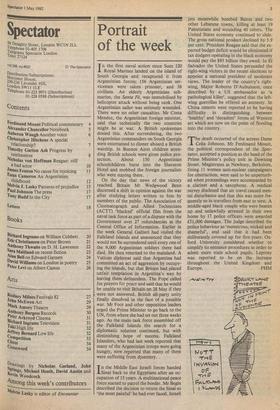Portrait of the week
I n the first naval action since Suez 120 I Royal Marines landed on the island of South Georgia and recaptured it from Argentinian forces; 156 Argentinian ser- vicemen were taken prisoner, and 38 civilians. An elderly Argentinian sub- marine, the Santa Fe, was immobilised by helicopter attack without being sunk. One Argentinian sailor was seriously wounded. There were no other casualties. Mr Costa Mendez, the Argentinian foreign minister, said that technically the two countries might be at war. A British spokesman denied this. After surrendering, the two Argentinian commanders on South Georgia were entertained to dinner aboard a British warship. In Buenos Aires children atten- ding British schools were given police pro- tection. About 150 Argentinian schoolchildren burst into the Sheraton Hotel and mobbed the foreign journalists who were staying there.
On the day that news of the victory reached Britain Mr Wedgwood Benn discerned a shift in opinion against the war after studying letters written to him by members of the public. The Association of Cinematograph and Allied Technicians (ACTT) 'blacked' official film from the naval task force as part of a dispute with the Government over 27 redundancies at the Central Office of Information. Earlier in the week General Galtieri had visited the Falkland Islands and announced that they would not be surrendered until every one of the 9,000 Argentinian soldiers there had died. He then returned to the mainland. A Vatican diplomat said that Argentina had committed an act of aggression by occupy- ing the islands, but that Britain had placed unfair temptation in Argentina's way by leaving them defenceless. The Pope called for prayers for peace and said that he would be unable to visit Britain on 28 May if they were not answered. British all-party unity finally dissolved in the face of a possible war. Mr Foot and other opposition leaders urged the Prime Minister to go back to the UN, from where she had set out three weeks ago. As the main task force assembled off the Falkland Islands the search for a diplomatic solution continued, but with diminishing hope of success. Falkland Islanders, who had last week reported that many of the Argentinian troops were going hungry, now reported that many of them were suffering from dysentery.
In the Middle East Israeli forces handed
Sinai back to the Egyptians after an oc- cupation of 15 years. A multinational peace force started to patrol the border. Mr Begin described the decision to return the Sinai as `the most painful' he had ever faced. Israeli jets meanwhile bombed Beirut and two other Lebanese towns, killing at least 19 Palestinians and wounding 40 others. The United States economy continued to slide. The gross national product declined by 3.9 per cent. President Reagan said that the ex- pected budget deficit would be eliminated if tax dodgers operating in the black economy would pay the $95 billion they owed. In El Salvador the United States persuaded the right-wing victors in the recent elections to appoint a national president of moderate views. The leader of the country's right- wing, Major Roberto D'Aubuisson, once described by a US ambassador as 'a pathological killer', suggested that the left- wing guerrillas be offered an amnesty. In China censors were reported to be having difficulty in distinguishing between `healthy' and 'decadent' forms of Western art which are now on the point of flooding into the country.
The death occurred of the actress Dame Celia Johnson. Mr Ferdinand Mount, the political correspondent of the Spec- tator, accepted a position as the head of the Prime Minister's policy unit in Downing Street. Magistrates at Newbury, Berkshire, fining 11 women anti-nuclear campaigners for obstruction, were said to be unperturb- ed when proceedings were accompanied by a clarinet and a saxophone. A medical survey disclosed that air travel caused men- tal disturbance and that this was more fre- quently so in travellers from east to west. A middle-aged black couple who were beaten up and unlawfully arrested in their own home by 17 police officers were awarded £51,000 damages. The judge described the police behaviour as 'monstrous, wicked and shameful', and said that it had been deliberately covered up for five years. Ox- ford University considered whether -to simplify its entrance procedures in order to admit more state school pupils. Leprosy was reported to be on the increase throughout the United Kingdom and






































 Previous page
Previous page